Say “Merhaba” (Hello) to a Semester in Istanbul
Immersion while Studying and Living Abroad in a Magical Turkish City
Article and photos by Jamie Balard
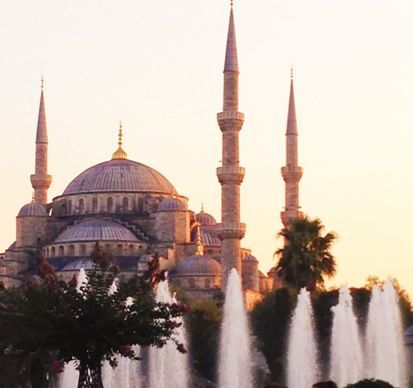
|
|
The Blue Mosque.
|
The sun sets over Istanbul, casting an orange haze over the city. The call to prayer echoes over the Bosphorus, coming from several different directions, from the Hagia Sofia, the Blue Mosque, and the Yeni Cami, as they alternate singing parts of the prayer. People spill out from the art galleries in Galata and grab a latte from one of the Brooklyn-esque cafes before rushing to catch the ferry from Karaköy to the Asian neighborhood of Kadıköy. And this is just one glimpse into one microcosm in this teeming, thriving city that I call home for the fall semester.
Studying abroad in Istanbul was the best decision I’ve ever made. Here’s what I’ve learned along the way. Hopefully, it can help other students curious about studying in Turkey.
Before You Go
Think about what you hope to gain from the experience. Why do you want to go to Istanbul? You’ll be asked this question many times throughout the process of applying, so take some time at the beginning of your stay to genuinely consider your motives. There are a lot of benefits to studying in an active and rapidly changing city such as Istanbul, especially if you’re pursuing a field like international relations, political science, or journalism. Architecture and history buffs will also find delight here, with ancient structures like the Hagia Sophia, Basilica Cistern, and the Blue Mosque waiting for you to explore.
Look into your university's options to determine the best one for you. Several English-speaking universities in Istanbul have exchange programs with universities across the globe. Bahçeşehir University, where I am studying, hosted students from over 180 countries during the fall term. Many of the universities in Turkey focus on bringing global students into the fold and encouraging international exchange. To that end, some of the schools offer perks such as free accommodations to exchange students.
Studying abroad was something I really wanted to do during my time in college at San Diego State University. Yet, like many students, I didn’t think I could afford it. Still, I went to the study abroad office to see if any options would work with my financial aid setup. After exploring my options, it turns out that living in Istanbul instead of San Diego for a semester actually saved me money!
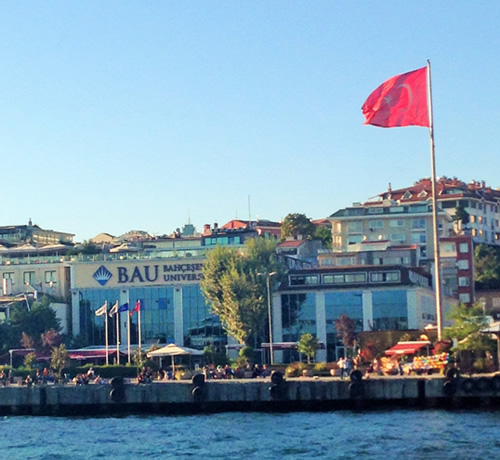
|
|
One of the Bahçeşehir University campuses.
|
Given the number of global universities in Istanbul, check to see if your home university has relationships with any of them. Talk with your study abroad advisor to determine which university will best suit your financial, academic, and cultural needs.
Do your research before you go. There are many things I wish I had known before I arrived in terms of culture, language, and politics.
Great resources include:
Some of the most helpful resources are the people at your home university and your destination. I found my home university in San Diego to be extremely helpful in preparing me to study abroad in Turkey. They organized a Q&A session, especially for students going to Istanbul. Your school may offer something similar.
Additionally, the school abroad may put you in contact with a coordinator before your departure. At Bahçeşehir University, we were in contact with an international administrator as well as a “Turkish buddy,” a student who was available to answer any questions and who helped guide us around Istanbul our first week.
Make sure you’re ready for a challenge! Istanbul is like nowhere else in the world, which is one of the best parts of studying here…but it’s also one of the most challenging. Very few things are intuitive — even tasks that seem as if they should be simple. Additionally, you may find the culture to be much different than what you’re used to, which is both a blessing and a curse. But don’t worry about it — you’ll get the hang of it in time.
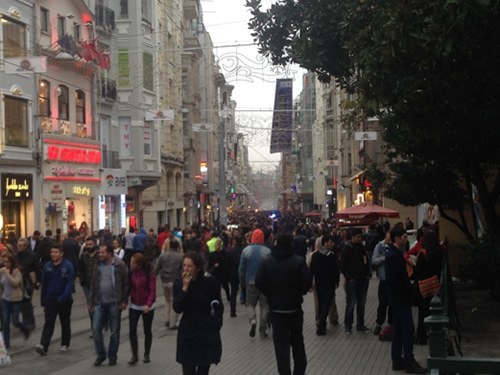
|
Taksim is one of the more chaotic and challenging neighborhoods and one of the most fun!
|
Taksim, one of the more chaotic and challenging neighborhoods, but also one of the most fun!
|
Once You’re Living in Istanbul
Don’t be afraid to ask for help. Turkish people tend to be very considerate when it comes to helping others. Even with a language barrier, I’ve found that most people are willing to help give directions, find transportation, and provide service.
During my first few days living here, I came down with an awful, stuffy, coughing all-day-and-night cold. I finally caved and went to find some medicine. I walked into an Ezcane (pharmacy) and quickly realized that I had no idea how to say “sick,” “head cold,” or “sore throat” in Turkish. I smiled hesitantly at the elderly pharmacist, pointed at my nose, and sniffled. Then I coughed loudly and pointed at my throat.
It worked. He handed me a box, held up two fingers to indicate that I should take two at a time, and then, with a heavy accent, smiled and winked and said, “Eat ice cream for bad throat.”
There have been many other times when I’ve needed help to figure out where to find the metro, how to send a postcard, how much it costs to buy food from a street vendor, and a hundred other things. Sometimes it’s easy, sometimes it isn’t easy, but I always get through it, and so will you.
More often than not, it’s a fun and even funny experience.
Many people struggle with asking for help, but it’s really the best course of action in many instances. I used to hate asking anyone for help, but the reality is that sometimes you have no other option. Turkish hospitality makes it easy to ask for help to solve your problem.
Respect the culture you’re living in. As mentioned above, the culture of Istanbul is likely different than what you’ve encountered. For example, women's dress style tends to be more conservative in Istanbul than in the U.S. If you want to avoid uncomfortable attention, you should wear clothing that keeps your legs and shoulders covered out of respect for the host country's values and traditions.
Another essential way to show respect to local people is by learning a little Turkish. It makes a big difference. Learning how to greet people, say hello and goodbye, say thank you, and ask, “How are you?” will go a long way in demonstrating your respect for the proud people, culture, and country.
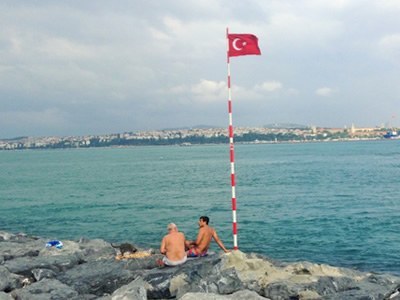
|
|
If I had to pick one picture to sum up Istanbul, it would be this one.
|
Above all, try to keep an open mind. If you don’t understand a particular custom, political issue, or religious practice, ask polite questions and do your own research with the intention of understanding. Do your best not to think of your ideology as “right” and someone else’s as “wrong;” get into the habit of acknowledging them as “different.”
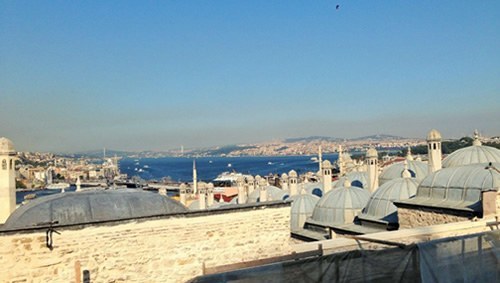
|
|
With such a strong Islamic presence in Istanbul, you’re sure to learn a great deal about Muslim culture.
|
For example, there is a September holiday called Eid al-Adha, or the Feast of Sacrifice. It’s an Islamic holiday on which people celebrate Abraham’s willingness to sacrifice his son as a form of obedience to God. Sacrificing an animal like a sheep or a cow does actually occur.
Many Americans and other world citizens might object to the idea of slaughtering animals in the street as part of a religious celebration. It’s just not something Americans typically do anywhere in the country. But while speaking to a Turkish friend of mine, he explained that it’s not only a way of worship but also a happy, celebratory time. Families get together and exchange gifts, and people are focused on ensuring that people experiencing poverty are well-fed and clothed. Overall, it’s a festive occasion for locals.
“Besides,” he said, “you do eat meat in America all the time; you just don’t watch it get killed.” That resonated with me. So, while I’m not necessarily going to bring that particular tradition back to the States, it opened my mind to certain religious and cultural customs.
Make time for solo exploration. Istanbul is a very social city; you’ll receive many invitations to parties, weekend trips, and other excursions. And you should accept them! However, I also found exploring different areas and attending some events very beneficial.
Going somewhere alone made me more receptive to my surroundings and forced me out of my comfort zone. It is very freeing! It can also be an excellent time to reflect on your experiences. I always bring my travel journal with me when I’m spending the day alone.
One of my favorite areas is Bebek, a little waterfront area with many trees, parks, and walking paths just north of the Bosphorus Bridge. I found it by accident one day when I was alone exploring the city. Now, it’s an extraordinary, peaceful place for me. I probably would never have found it if I had kept tagging along with my friends.
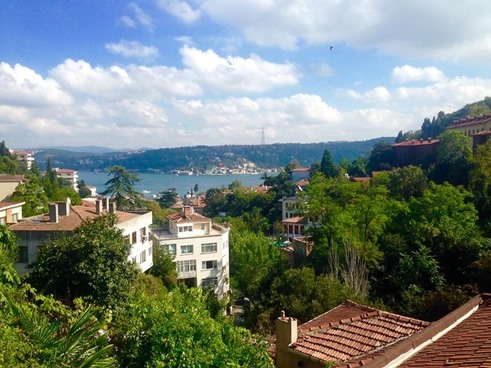
|
|
Bebek is a serene waterfront neighborhood in northern Istanbul.
|
Take a deep breath. Istanbul can be chaotic and overwhelming. As with any study abroad experience, there will be days when nothing goes how you want, when people aren’t helpful, and when you feel homesick. That’s okay. Don’t feel guilty for feeling bad occasionally; find a way to cope. Skype your parents, re-read a favorite book, and go for a run. Find ways to manage the stress, stay calm, and don’t hesitate to reach out if the feeling becomes too much to handle on your own.
Document the experience. This is a once-in-a-lifetime experience — keep track of it! Take pictures of everything, write events and impressions down in a journal, and collect little trinkets and souvenirs along the way. When you look back on this adventure, you’ll be happy to re-discover some of the experiences you had forgotten. No one’s ever returned home from studying abroad and said, “I wish I took fewer pictures,” or “I shouldn’t have written that down.”
This is also where social media can come in handy. The world we live in today makes it easier than ever to share your experiences through photography and writing. The added bonus is that you also have a digital record of everything notable that you shared while abroad.
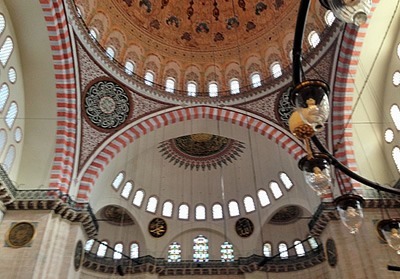
|
|
Yeni Cami Mosque, also known as the “New Mosque.”
|
Safety. Overall, Istanbul is a very safe city. But just as you would at home, use your common sense and good judgment to avoid potentially dangerous situations. However, there are a couple of things you should be aware of as a foreigner in Turkey.
-
Political demonstrations occur. While sometimes interesting to witness, it’s generally safer to avoid getting caught up in a such domestic demonstrations.
-
Being obviously western can make you a target. Even if you do your best to blend in, there’s still a good chance you’ll stand out in many situations as a foreigner. Be aware and trust your intuition, steering clear of crowds and individuals if you feel uncomfortable.
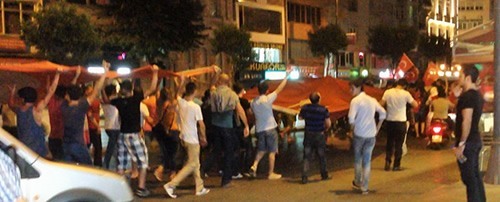
|
|
A demonstration in Istanbul.
|
Studying in Istanbul is one of the most life-changing and incredible things I have ever done. Every day brings limitless potential for new adventures. What I have learned and experienced in Istanbul has provided the impetus to return, visit friends, and continue to explore the city that has captured my heart.
Jamie Ballard is a student journalist who works and travels through Turkey. Originally from Sonoma, she attends San Diego State University, where she's a proud member of the waterski team and a dedicated news writer for The Daily Aztec. She is keenly interested in traveling and plans to be a multimedia journalist.
|
